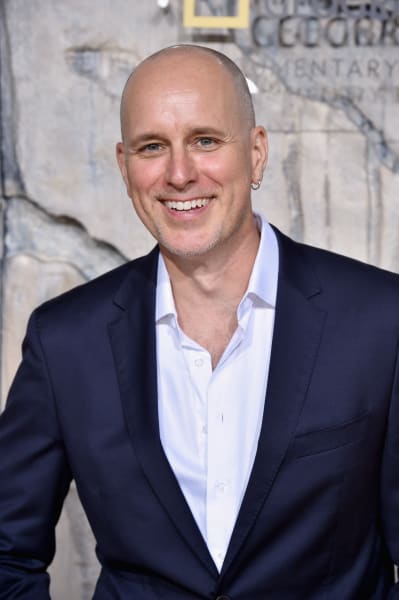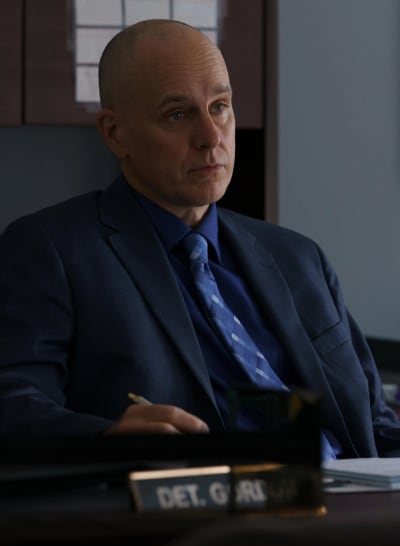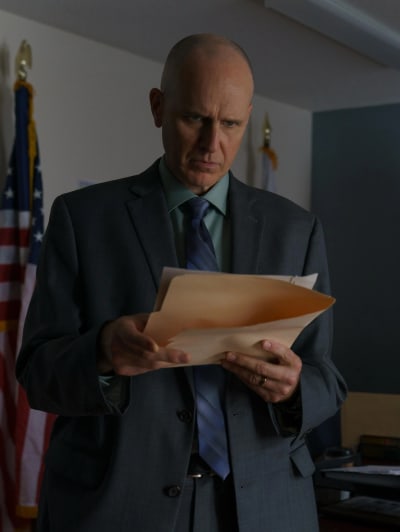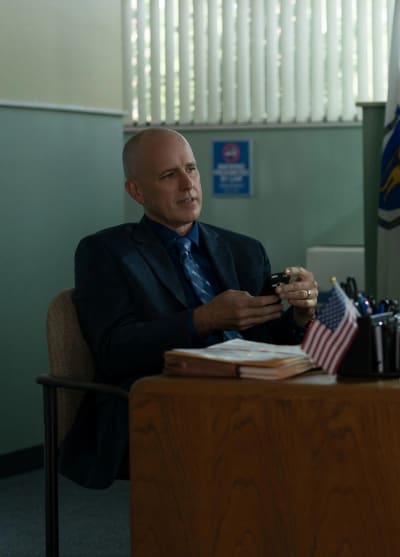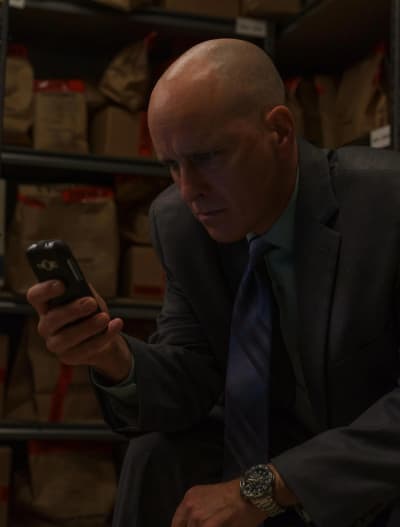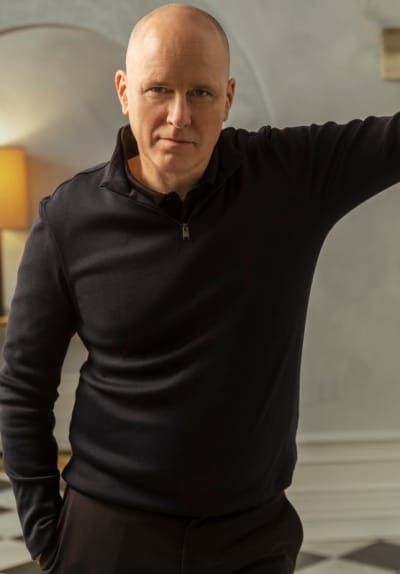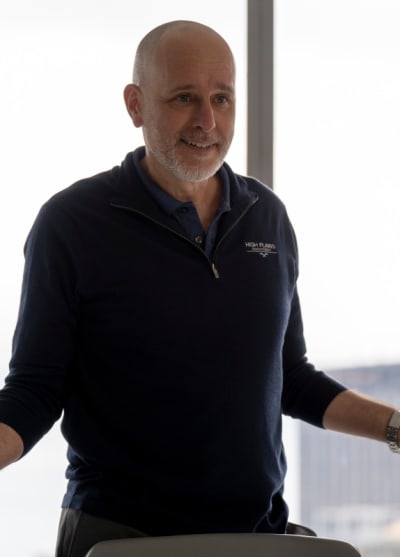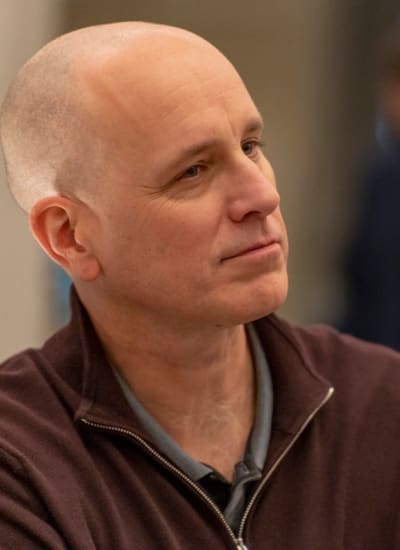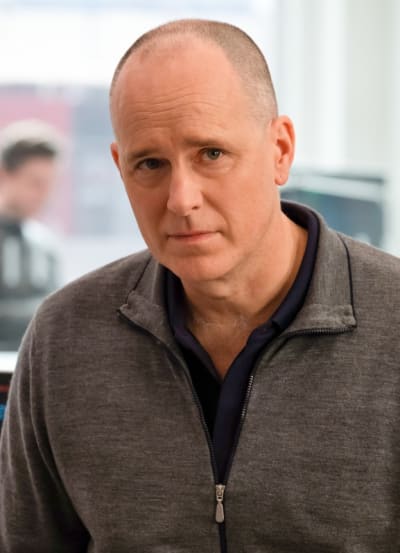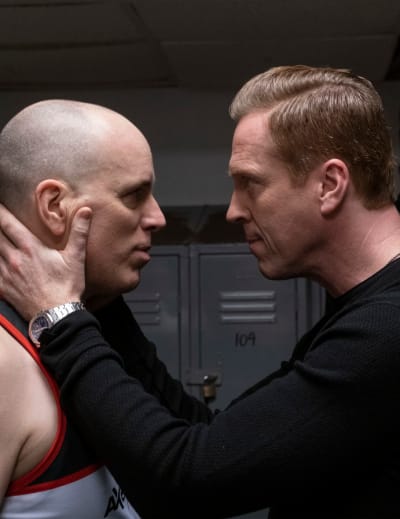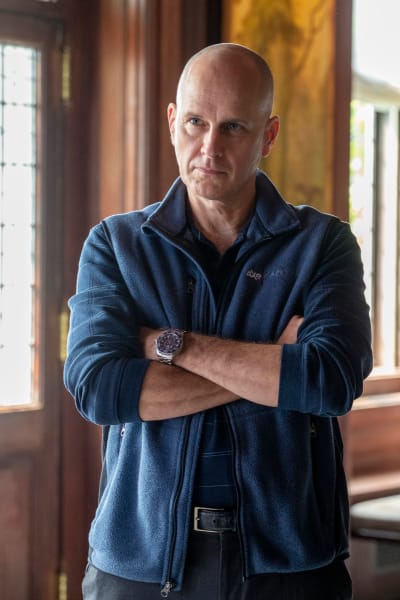You may know Kelly AuCoin from his role on Billions, but he’s also going to be playing a detective on Hulu’s The Girl From Plainville.
We had a chance to catch up with him by phone to talk about it. And yes, we touch on Billions, too.
It was a beautiful day on the East Coast, where we are both located, and after chatting about how nice it was to feel warm sunshine, we jumped headfirst into The Girl From Plainville.
The series tackles a very heartwrenching true-crime incident in which two teens connect, and one dies by suicide, somewhat at the urging of the other.
It’s not easy to watch, but AuCoin said he and his castmates approached the material with open-mindedness as they attempted to get into the minds of the people they were portraying.
That’s a critical viewpoint in this story that initially wasn’t covered with the same respect.
“You can’t tell the story in a respectful way unless you approach it with some sort of nonjudgmental approach. And I think that’s the case with art when it does portray real events.
“If you are telling the audience what to think and what to believe, then you’re doing a disservice to any of the characters, all of the characters. You’re doing it just to get whatever the truth is. Even any of us, knowing exactly what the truth or the capital T is difficult and somewhat sketchy.
So really appreciated how honestly people approach their care characters and how available people were to go on that ride, which is not a pleasant ride.”
The heavy content didn’t permeate the on-set experience, though.
“I wouldn’t say it was lighthearted, but it was a very good group of good-spirited people who got along extremely well. And like anything, you have to be able to have moments where you blow off steam. And there was a good amount of laughter backstage, and a really good camaraderie built up, even amongst people who we were portraying were not feeling that.”
AuCoin plays Detective Scott Gordon, the man who initially finds discrepancies in the story that warrant further investigation into Michelle Carter, the young woman who had a relationship with Conrad “Coco” Roy, who ultimately died by suicide.
“From my perspective, Scott Gordon is a methodical, imaginative thinker. And I think he is a deeply human, humane person. And discovering that trail of text, that material, just the overwhelming weight of that, I think, moved him, and it jarred him. And it makes him want justice for this boy.
“His sense of outrage, whatever anyone thinks of it in the end, whether or not it was warranted, comes from a place of humanity, and it comes from a place of justice. And it comes from a place of sympathy for this family and for this young man.”
The Girl From Plainville aims to provide context on Carter and Roy’s relationship to help understand how Roy’s death happened. It’s something that could be very helpful to the families even if they weren’t involved in the production.
AuCoin said, “I mean, there are scenes where Colton’s mother is just like — I can’t remember the exact lines — ‘but I was just talking to him today. He said he was happy today or yesterday, or the day before, whichever one it was.’
“Just that sense of mystery, that sense of, they’re never going to know what happened in those final moments or what their kid went through in those final moments. And that’s got to be heartrending. So finding out anything as opposed to finding out nothing has got to be, I would imagine, would be some comfort, no matter how slight.”
Before taking the role, AuCoin had a cursory understanding of the story, which really shocked him. At the time, he recalls that the story was covered in the press from the bullying standpoint because that was the issue of the moment.
“No one was asking me for my opinion, but certainly, the opinion I formed was a pretty simplistic take on things,” he said.
“When doing research for Girl from Plainville, watching the documentary, reading the Esquire article, it became slowly clear that this was a much more complicated case than anybody really, I think, knows even now.
“And so, when the script came across my computer, and the chance to audition for it came up, it really piqued my interest. It was a chance to delve into this thing I hadn’t given a lot of deep thought to in the past, back when it happened.
“So I do appreciate how they approached it and the complexity with which they honored the complexity of the situation, I think.”
As we discussed the story, we circled back to the bullying angle that was a topic of discussion when Roy’s death and Carter’s role in it was in the press.
When I wondered how our understanding of the story would have presented itself in current times, AuCoin said, “What if it had happened during this period of time when our culture was consumed with the idea of lack of self-esteem for young women and girls, and how differently that would’ve been told? That is a fascinating thought, isn’t it?”
With fewer people gathering information from varying avenues (“It’s certainly something that Twitter hasn’t helped us with,” AuCoin said), the best we can hope for is that the people reporting on a story offer enough information across the varying landscape to form your own opinion.
AuCoin plays Detective Gordon with a great deal of conflict. With each new discovery, Gordon struggles to process what he’s learning about Carter and Roy.
AuCoin accurately portrays Gordon’s empathy for both Carter and Roy, and if his performance had differed, it would have swayed the audience how to think.
“The first couple of episodes we shot, Lisa Cholodenko was the director. And we had a lot of conversations about tone and about the detective’s approach to things, and Liz Hannah as well. And so I’m glad that some of that came across.
“I do think this character is a deeply humane character, and everything he did, pushing the case in a certain way, was based on this idea of justice and humanity. And so, I’m glad that came across,” AuCoin said.
AuCoin mentioned struggling with the contradiction between the material and his on-set experience in terms of the art of it and how the impressive cast — Chloë Sevigny, Aya Cash, and Elle Fanning) all came together with their A-game performances.
“It doesn’t matter what the topic is or what the stakes of the thing you’re playing are. If you get people who play ball and who are at the top of their game, you’re going to have fun on a certain level, even if it’s hard. And it was such a wonderful experience in that way.
“And then added to that, I’m very proud of that the show handled things in the way that they did. I don’t think there’s a salacious moment, at least in the stuff I’ve seen. There’s not a salacious moment in it. And I really appreciate that.”
In discussing the number of real-life stories now getting the series treatment, AuCoin laughed as he’s got some part, no matter how big or small, in three of them — The Girl From Plainville, Super Pumped, and WeCrashed, in which he plays another Scott G.
“Each one of them, from what I’ve seen — I’ve seen a couple of WeCrashed and a little bit of Super Pumped, and I haven’t seen Girl from Plainville yet — but each one of them has a different style and a different take on how to tell these real stories, these true to life stories.
“And that’s fascinating to see, get in the mind of the showrunners. This is the way we want to tell this story. And I think especially The Girl from Plainville, a piece like this, there are some really interesting stylistic choices, but in a way, they played it straight too, if that makes any sense.”
AuCoin was speaking specifically about choices such as removing the cold on-screen barrier from Carter and Roy’s texts, allowing Fanning and Colton Ryan to engage in various settings as if the two were speaking face-to-face, which allows warmth between the two that otherwise could be interpreted differently.
AuCoin noted different styles WeCrashed and The Girl From Plainville used to tell their stories.
“Stylistically, [WeCrashed] is the type of show that can take [fantastical] leaps because while was a downfall of a corporation and a lot of people got hurt, it was different than something like The Girl from Plainville, where there was a true human tragedy., and it’s a little less dignified to take those types of fun leaps. But it’s been interesting to see the different choices these shows have made.”
AuCoin gets a kick out of people who see his name associated with numerous projects with the belief he’s a very busy man. He sees it a little differently, although he appreciates being seen.
Among other recent roles was a part on Freeform’s The Bold Type as a father of one of the main characters.
“I was just telling someone about this too, but the crazy thing is he’s this father who loves his daughter so much, he tears up in every one of the three episodes he’s in. It’s just so sweet.
“And the woman who wrote it gave me a straight offer, which was great, said she was a huge fan of Billions, loved Dollar Bill, and she wrote the character for me, based on seeing Dollar Bill. I was like, ‘In what world did you think, based on that, that I could be this?’ And she’s like, ‘I don’t know. I saw cracks. I saw the cracks in the character.’ I thought it was great.”
AuCoin finds it fascinating that imaginative people can watch actors in a role and picture them in something entirely different.
Currently in its sixth season, Billions has incredible staying power. Sadly, I had to share that I wasn’t a fan because of my career in the hedge fund industry. He understood.
“That’s interesting. I grew up in a political family. My dad was in Congress for 18 years, and I think he and my family and a lot of people who spent time in politics didn’t necessarily love the show. And maybe it was because it was too close to home, or maybe it was like, it didn’t happen that way. And it’s like, well, it’s not actually supposed to be an exact replica of what [it’s like].
“But I think maybe there are some finance people who go either way too, some people who just dive in and absolutely love it because their world is being portrayed, and other people, who I’ve heard say things like, ‘It doesn’t happen exactly that way.’
“Again, this is not trying to portray your experience. This is using this world as a jumping-off point. Anyway, with Billions, I think it’s super fun to watch people misbehave.
“And what I love about Billions is that people from all over the political spectrum like the show. My lefty friends, a lot of them love it. And my friends who are more on the right love it.
“I do find it interesting when people on the street talk about why they love the show and my character. I start to realize some people find it aspirational. They think of Dollar Bill as an aspirational character. And I’m like, ‘You know he’s a criminal, right?’
“He’s not a good person, per se, but I think the character … It’s such a well-written show. And I think that the actors play the hell out of their characters. And I think the chemistry between the characters has been so strong and just grown stronger with each season. I think that translates.
“We have such a fun time. As I’ve said to people many times, the amount of misbehavior exhibited by these characters is an almost inverse proportion to the quality of human beings that they are and the sweetness that they actually exhibit and give back and forth to each other on set and in real life.
We’re all friends. We all have a great time. And Stephen Kunken, Ari Spyros, and I, Dollar Bill, are great friends, and we’ll be in each other’s faces and yelling at each other and shoving, and then we’re just giggling afterward. I think that kind of chemistry translates to the screen.
That kind of on-screen tension, though, gives AuCoin a way to blow off steam, leaving real-life tension at the office, so to speak. “My jaw is set so tight and so jutted forward, usually when I’m playing that character, that I come home and my face hurts. And my wife has made it clear that if I bring any of that character home, I’m out. So good for her.”
Continuing after losing a lead character on a long-running show can be quite a risk. When Damian Lewis exited the show, he took Bobby Axelrod with him. AuCoin had lovely things to say about Lewis as a leading man who kept things moving on set with his leadership and in scenes with his generosity as an actor.
“A show like that won’t always necessarily become a family or an ensemble, but this one did. And it’s largely because of the example he set. So yeah, you wonder, you worry about changing up the dynamic that feels so fundamental to a show, but there are all kinds of wonderful actors on the show that remain.
“And we have a brilliant casting director, and we have brilliant writers, and they created something, not trying to recreate what Ax brought to the table, but creating something that was a logical extension or a logical counter, something that would still work in this world, wasn’t trying to recreate that, because you can’t.
“I mean, there’s only one Damian, but there’s also only one Corey Stoll. And he’s a great actor, and he’s taken the opportunity to really run with it. Prince is a very different character, and he is very compelling to me because we still don’t know who Prince really is.
“Maybe we do, and we’re just looking for more cracks than there are, but I suspect there are more cracks. And I’m very curious to see where it goes next season.”
The story is constantly in flux, and the writers are news junkies who have their pulse on the latest movements that could influence the industry.
“I’d say they definitely have their finger on the pulse of what’s happening in New York and then in the country. So I wouldn’t be surprised if, as news events happen, they weigh whether or not to add them to scripts. But I honestly don’t know for sure.
“I know that they have, at least I’ve heard them say, that they have their thoughts about where these stories are going to go. And I suspect that the story arcs are paramount, and then they can flavor things with little bits here and there.
“The opening of season six when Wags is on the Peloton, and Prince puts these watches or these bands on everybody’s arms, and they noticed that his heart rate’s a little too high, and they burst in to save him or to protect him.
“Apparently, they added the line about Mr. Big because, in the Sex and the City reboot, they didn’t know this when they wrote the script, but the same thing happened, and he actually died. So he is like, ‘I’m not about to go all Big on you,’ or whatever he said. So they know what’s going on. Certainly.”
With time left for one last question, I touched upon The Americans, where he played Pastor Jennings. Given the world climate, where would he imagine The Americans would tackle the world as it is now.
“Where The Americans would pick up a story? I think we would discover that a certain former president, former real estate mogul, had been an asset placed by them. [laughs] I don’t know.
“But I always did think it would be interesting. Because the ’80s, when this was taking place, was when the Trump family was first really in the media and making all these overtures, that it would’ve been interesting if they had made a trip — like Elizabeth makes a trip to New York in some honeypot scheme.
“There’s this redheaded billionaire, kind of dopey billionaire, who she gets something on. And then, years later, he plays the president as an asset. I always thought that would be an interesting story.”
Be sure you catch AuCoin in his latest role on beginning Tuesday, March 29 on Hulu’s The Girl From Plainville, and keep watching him as Dollar Bill on Billions, Sundays on Showtime.
Carissa Pavlica is the managing editor and a staff writer and critic for TV Fanatic. She’s a member of the Critic’s Choice Association, enjoys mentoring writers, conversing with cats, and passionately discussing the nuances of television and film with anyone who will listen. Follow her on Twitter and email her here at TV Fanatic.


